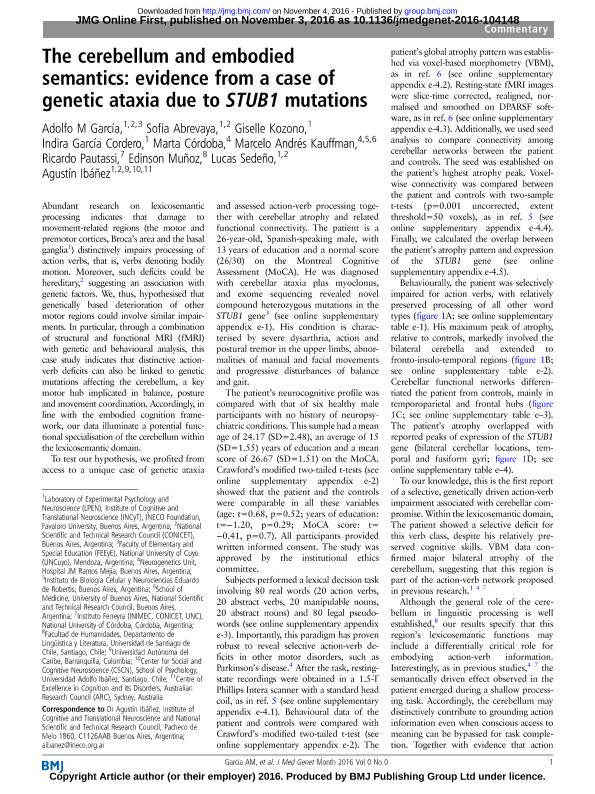Artículo
The cerebellum and embodied semantics: evidence from a case of genetic ataxia due to STUB1 mutations
García, Adolfo Martín ; Abrevaya, Sofia
; Abrevaya, Sofia ; Kozono, Giselle; García Cordero, Indira Ruth
; Kozono, Giselle; García Cordero, Indira Ruth ; Córdoba, Marta
; Córdoba, Marta ; Kauffman, Marcelo Andres
; Kauffman, Marcelo Andres ; Pautassi, Ricardo Marcos
; Pautassi, Ricardo Marcos ; Muñoz, Edinson; Sedeño, Lucas
; Muñoz, Edinson; Sedeño, Lucas ; Ibañez, Agustin Mariano
; Ibañez, Agustin Mariano
 ; Abrevaya, Sofia
; Abrevaya, Sofia ; Kozono, Giselle; García Cordero, Indira Ruth
; Kozono, Giselle; García Cordero, Indira Ruth ; Córdoba, Marta
; Córdoba, Marta ; Kauffman, Marcelo Andres
; Kauffman, Marcelo Andres ; Pautassi, Ricardo Marcos
; Pautassi, Ricardo Marcos ; Muñoz, Edinson; Sedeño, Lucas
; Muñoz, Edinson; Sedeño, Lucas ; Ibañez, Agustin Mariano
; Ibañez, Agustin Mariano
Fecha de publicación:
11/2016
Editorial:
B M J Publishing Group
Revista:
Journal Of Medical Genetics
ISSN:
0022-2593
e-ISSN:
1468-6244
Idioma:
Inglés
Tipo de recurso:
Artículo publicado
Clasificación temática:
Resumen
Abundant research on lexicosemantic processing indicates that damage to movement-related regions (the motor and premotor cortices, Broca´s area and the basal ganglia1) distinctively impairs processing of action verbs, that is, verbs denoting bodily motion. Moreover, such deficits could be hereditary,2 suggesting an association with genetic factors. We, thus, hypothesised that genetically based deterioration of other motor regions could involve similar impairments. In particular, through a combination of structural and functional MRI (fMRI) with genetic and behavioural analysis, this case study indicates that distinctive action-verb deficits can also be linked to genetic mutations affecting the cerebellum, a key motor hub implicated in balance, posture and movement coordination. Accordingly, in line with the embodied cognition framework, our data illuminate a potential functional specialisation of the cerebellum within the lexicosemantic domain.To test our hypothesis, we profited from access to a unique case of genetic ataxia and assessed action-verb processing together with cerebellar atrophy and related functional connectivity. The patient is a 26-year-old, Spanish-speaking male, with 13 years of education and a normal score (26/30) on the Montreal Cognitive Assessment (MoCA). He was diagnosed with cerebellar ataxia plus myoclonus, and exome sequencing revealed novel compound heterozygous mutations in the STUB1 gene3 (see online supplementary appendix e-1). His condition is characterised by severe dysarthria, action and postural tremor in the upper limbs, abnormalities of manual and facial movements and progressive disturbances of balance and gait.
Palabras clave:
Cerebellum
,
Embodied Semantics
,
Ataxia
,
Stub1 Mutation
Archivos asociados
Licencia
Identificadores
Colecciones
Articulos(IBCN)
Articulos de INST.DE BIOLO.CEL.Y NEURCS."PROF.E.DE ROBERTIS"
Articulos de INST.DE BIOLO.CEL.Y NEURCS."PROF.E.DE ROBERTIS"
Articulos(INCYT)
Articulos de INSTITUTO DE NEUROCIENCIAS COGNITIVAS Y TRASLACIONAL
Articulos de INSTITUTO DE NEUROCIENCIAS COGNITIVAS Y TRASLACIONAL
Articulos(INIMEC - CONICET)
Articulos de INSTITUTO DE INV. MEDICAS MERCEDES Y MARTIN FERREYRA
Articulos de INSTITUTO DE INV. MEDICAS MERCEDES Y MARTIN FERREYRA
Articulos(OCA HOUSSAY)
Articulos de OFICINA DE COORDINACION ADMINISTRATIVA HOUSSAY
Articulos de OFICINA DE COORDINACION ADMINISTRATIVA HOUSSAY
Citación
García, Adolfo Martín; Abrevaya, Sofia; Kozono, Giselle; García Cordero, Indira Ruth; Córdoba, Marta; et al.; The cerebellum and embodied semantics: evidence from a case of genetic ataxia due to STUB1 mutations; B M J Publishing Group; Journal Of Medical Genetics; 54; 2; 11-2016; 1-3
Compartir
Altmétricas



